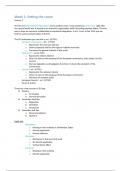Summary
Summary European law
- Course
- Institution
Summary of the course of european law. Summary is based on the lectures, knowledge clips and supplemented with information from the working groups. The summary is written in English. Useful images and graphics were taken from the lecture and added. Each week contains useful step-by-step plans to an...
[Show more]



